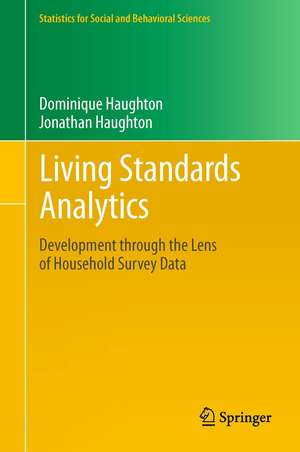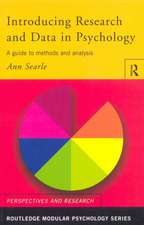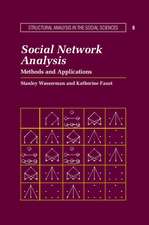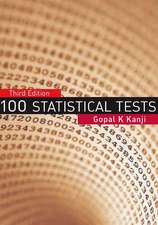Living Standards Analytics: Development through the Lens of Household Survey Data: Statistics for Social and Behavioral Sciences
Autor Dominique Haughton, Jonathan Haughtonen Limba Engleză Paperback – 27 oct 2013
Most of the chapters begin by introducing a methodological or policy problem, to motivate the subsequent discussion of relevant methods. They then summarize the relevant techniques, and draw on examples – many of them from the authors’ own work – and aim to convey a sense of the potential, but also the strengths and weaknesses, of those techniques.
This book is meant for graduate students in statistics, economics, policy analysis, and social sciences, especially, but certainly not exclusively, those interested in the challenges of economic development in the Third World. Additionally, the book will be useful to academics and practitioners who work closely with survey data. This is a book that can serve as a reference work, to be taken down from the shelf and perused from time to time.
| Toate formatele și edițiile | Preț | Express |
|---|---|---|
| Paperback (1) | 390.46 lei 6-8 săpt. | |
| Springer – 27 oct 2013 | 390.46 lei 6-8 săpt. | |
| Hardback (1) | 395.47 lei 6-8 săpt. | |
| Springer – 30 aug 2011 | 395.47 lei 6-8 săpt. |
Din seria Statistics for Social and Behavioral Sciences
-
 Preț: 361.84 lei
Preț: 361.84 lei - 18%
 Preț: 884.35 lei
Preț: 884.35 lei - 20%
 Preț: 696.32 lei
Preț: 696.32 lei - 15%
 Preț: 586.38 lei
Preț: 586.38 lei -
 Preț: 393.13 lei
Preț: 393.13 lei - 15%
 Preț: 648.24 lei
Preț: 648.24 lei - 18%
 Preț: 896.70 lei
Preț: 896.70 lei - 18%
 Preț: 904.11 lei
Preț: 904.11 lei - 18%
 Preț: 811.61 lei
Preț: 811.61 lei - 18%
 Preț: 782.10 lei
Preț: 782.10 lei - 15%
 Preț: 649.54 lei
Preț: 649.54 lei - 23%
 Preț: 788.32 lei
Preț: 788.32 lei - 15%
 Preț: 650.04 lei
Preț: 650.04 lei - 18%
 Preț: 806.87 lei
Preț: 806.87 lei - 18%
 Preț: 952.26 lei
Preț: 952.26 lei - 18%
 Preț: 1126.52 lei
Preț: 1126.52 lei - 18%
 Preț: 1005.11 lei
Preț: 1005.11 lei - 18%
 Preț: 1219.94 lei
Preț: 1219.94 lei - 18%
 Preț: 897.65 lei
Preț: 897.65 lei - 15%
 Preț: 588.37 lei
Preț: 588.37 lei - 15%
 Preț: 644.30 lei
Preț: 644.30 lei - 18%
 Preț: 730.97 lei
Preț: 730.97 lei -
 Preț: 381.21 lei
Preț: 381.21 lei - 15%
 Preț: 638.43 lei
Preț: 638.43 lei - 18%
 Preț: 1228.47 lei
Preț: 1228.47 lei -
 Preț: 386.81 lei
Preț: 386.81 lei - 15%
 Preț: 639.73 lei
Preț: 639.73 lei -
 Preț: 381.00 lei
Preț: 381.00 lei - 18%
 Preț: 1223.74 lei
Preț: 1223.74 lei -
 Preț: 385.25 lei
Preț: 385.25 lei - 15%
 Preț: 702.87 lei
Preț: 702.87 lei -
 Preț: 383.33 lei
Preț: 383.33 lei - 18%
 Preț: 1228.47 lei
Preț: 1228.47 lei -
 Preț: 390.25 lei
Preț: 390.25 lei
Preț: 390.46 lei
Nou
Puncte Express: 586
Preț estimativ în valută:
74.72€ • 79.90$ • 62.30£
74.72€ • 79.90$ • 62.30£
Carte tipărită la comandă
Livrare economică 18 aprilie-02 mai
Preluare comenzi: 021 569.72.76
Specificații
ISBN-13: 9781461430001
ISBN-10: 1461430003
Pagini: 336
Ilustrații: XXII, 314 p.
Dimensiuni: 155 x 235 x 18 mm
Greutate: 0.47 kg
Ediția:2011
Editura: Springer
Colecția Springer
Seria Statistics for Social and Behavioral Sciences
Locul publicării:New York, NY, United States
ISBN-10: 1461430003
Pagini: 336
Ilustrații: XXII, 314 p.
Dimensiuni: 155 x 235 x 18 mm
Greutate: 0.47 kg
Ediția:2011
Editura: Springer
Colecția Springer
Seria Statistics for Social and Behavioral Sciences
Locul publicării:New York, NY, United States
Public țintă
ResearchCuprins
Introduction.- Graphical exploratory methods.- Sample size issues.- Beyond linear regression.- Adjustment for spatial correlation.- The issue of causality.- Non-homogeneity/mixtures.- Bayesian analysis.- Grouping methods.- Panel data issues.- Measures of poverty and inequality.- Bootstrap.- Fuzzy methods for poverty measures.- Combining data sets.
Recenzii
Overall, the book is highly accessible and nicely produced. The authors characterise it as ‘a gateway book’, and I think that, for researchers in policy analysis and household survey work who learnt their trade some time ago, this is an apt description: The book provides an excellent introduction to some of the more recent developments. I shall certainly recommend it to colleagues in the public policy domain...It includes traditional staples such as linear regression and sampling, but also more recent and advanced tools such as the use of directed acyclic graphs in modelling causality, Kohonen networks to group data, Bayesian approaches, propensity score matching, and survival models. It also places considerable emphasis on the power of modern graphical methods – with the consequence that the book has some very attractive colour diagrams, such as bubble plots and cartograms, which certainly demonstrate the power of modern tools.
International Statistical Review, 81, 2, Review by David J. Hand
International Statistical Review, 81, 2, Review by David J. Hand
Notă biografică
Dominique Haughton (Ph.D. MIT 1983) is Professor of Mathematical Sciences at Bentley University in Waltham, Massachusetts, near Boston, and Affiliated Researcher at the Université Toulouse 1, France. Her major areas of interest are applied statistics, statistics and marketing, the analysis of living standards surveys, data mining, and model selection. She is the editor-in-chief of Case Studies in Business, Industry and Government Statistics (CSBIGS), and has published over fifty articles in scholarly journals, including The American Statistician, Annals of Statistics, Sankhya, Communications in Statistics, and Statistica Sinica. Dominique is a Fellow of the American Statistical Association.
Jonathan Haughton (Ph.D. Harvard 1983) is Professor of Economics at Suffolk University, and Senior Economist at the Beacon Hill Institute for Public Policy, both in Boston. A specialist in the areas of economic development, international trade, and taxation, and a prize-winning teacher, he has lectured, taught, or conducted research in over a score of countries on five continents. His Handbook on Poverty and Inequality (with Shahidur Khandker) was published by the World Bank in 2009, his articles have appeared in over 30 scholarly journals, and he has written numerous book chapters and over a hundred reports.
Textul de pe ultima copertă
The purpose of this book is to introduce, discuss, illustrate, and evaluate the colorful palette of analytical techniques that can be applied to the analysis of household survey data, with an emphasis on the innovations of the past decade or so.
Most of the chapters begin by introducing a methodological or policy problem, to motivate the subsequent discussion of relevant methods. They then summarize the relevant techniques, and draw on examples – many of them from the authors’ own work – and aim to convey a sense of the potential, but also the strengths and weaknesses, of those techniques.
This book is meant for graduate students in statistics, economics, policy analysis, and social sciences, especially, but certainly not exclusively, those interested in the challenges of economic development in the Third World. Additionally, the book will be useful to academics and practitioners who work closely with survey data. This is a book that can serve as a reference work, to be taken down from the shelf and perused from time to time.
Dominique Haughton is Professor of Mathematical Sciences at Bentley University and Affiliated Researcher at Université Toulouse I.
Jonathan Haughton is Professor of Economics at Suffolk University and Senior Economist at the Beacon Hill Institute for Public Policy.
Most of the chapters begin by introducing a methodological or policy problem, to motivate the subsequent discussion of relevant methods. They then summarize the relevant techniques, and draw on examples – many of them from the authors’ own work – and aim to convey a sense of the potential, but also the strengths and weaknesses, of those techniques.
This book is meant for graduate students in statistics, economics, policy analysis, and social sciences, especially, but certainly not exclusively, those interested in the challenges of economic development in the Third World. Additionally, the book will be useful to academics and practitioners who work closely with survey data. This is a book that can serve as a reference work, to be taken down from the shelf and perused from time to time.
Dominique Haughton is Professor of Mathematical Sciences at Bentley University and Affiliated Researcher at Université Toulouse I.
Jonathan Haughton is Professor of Economics at Suffolk University and Senior Economist at the Beacon Hill Institute for Public Policy.
Caracteristici
Together, the authors have over fifty years of experience working with household datasets, and have written over 200 papers, articles, and reports Includes chapters on sampling, causality, Bayesian methods, bootstrapping, impact evaluation, duration models, and modeling spatial effects Promotes harnessing of data, particularly from household surveys, to improve policy recommendations














